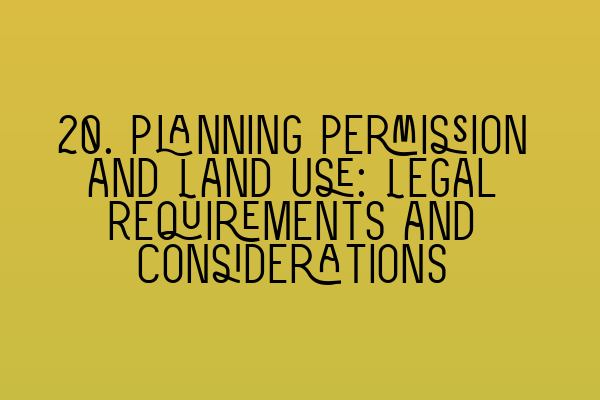Planning Permission and Land Use: Legal Requirements and Considerations
When it comes to property development and land use, understanding the legal requirements and considerations is crucial. Planning permission plays a significant role in determining what you can and cannot do with your land. In this article, we will delve into the intricacies of planning permission, highlighting the key legal aspects and important considerations to keep in mind.
1. What is Planning Permission?
Planning permission is the legal authorization granted by local government authorities that allows you to build, alter, or change the use of a property. It ensures that all new developments and changes to existing buildings align with the local planning policies and regulations in place.
Before embarking on any development project or substantial changes to your property, obtaining planning permission is essential to ensure compliance with the law. Failure to obtain planning permission can result in legal consequences, including hefty fines and forced demolition of unauthorized structures.
1.1. Types of Planning Permission
There are several types of planning permissions, depending on the nature and scope of the proposed development:
- Full Planning Permission: This is the most common form of planning permission, which allows for the full development of a property as proposed.
- Outline Planning Permission: This type of permission provides a broad outline for a proposed development, without specifying all the details.
- Reserved Matters Planning Permission: This permission is required after outline planning permission is granted to address specific details, such as appearance, landscaping, and access.
- Listed Building Consent: When a proposed development involves a listed building, this consent is required to ensure that the architectural or historic significance of the building is preserved.
- Lawful Development Certificate: This certificate is obtained when the proposed development falls within the scope of permitted development rights, eliminating the need for full planning permission.
Understanding the specific type of planning permission required for your project is vital to ensure compliance with the law and avoid unnecessary delays.
2. Legal Considerations
When seeking planning permission, there are several legal considerations that must be taken into account:
2.1. Local Development Plan
The local development plan, also known as the Local Plan, sets out the planning policies and guidelines for a specific area. It outlines the objectives, principles, and rules that govern land use and development.
Before submitting a planning application, it is essential to review the local development plan to ensure that your proposed development aligns with the policies and guidelines set out by the local authority.
2.2. Planning Policy Guidance
Planning Policy Guidance (PPG) documents provide detailed guidance on various planning matters issued by the government. These documents offer insights into specific planning considerations, such as sustainable development, design, and heritage preservation.
Staying informed about the relevant PPG documents can help you understand the specific requirements and considerations that may apply to your development project.
2.3. Environmental Impact Assessment
For large or environmentally significant projects, an Environmental Impact Assessment (EIA) may be required. An EIA evaluates the potential environmental effects of a proposed development, ensuring that any detrimental impacts are identified and addressed.
Consulting with environmental experts and conducting an EIA, when necessary, is crucial not only for obtaining planning permission but also for demonstrating your commitment to sustainable development.
3. The Planning Application Process
Submitting a planning application involves a comprehensive process that includes the following steps:
3.1. Pre-application Consultation
Engaging in pre-application consultation with the local planning authority and relevant stakeholders is a valuable step to gather feedback and address concerns before submitting your planning application. This consultation enables you to refine your proposal and increase the chances of a successful application.
3.2. Submitting the Application
Once you have finalized your development proposal and addressed any concerns raised during pre-application consultation, you can submit your planning application to the local planning authority. The application should include all the necessary documents, plans, and supporting information required by the authority.
3.3. Decision Period
After the initial application submission, the local planning authority will review the proposal and conduct assessments to determine whether it aligns with planning policies and regulations. The decision period can vary, but you should typically expect a decision within eight weeks.
3.4. Appeal Process
If your application is rejected, you have the right to appeal the decision through an independent appeals process. It is essential to seek legal advice and understand the grounds on which an appeal can be made before proceeding.
On the other hand, if your application is successful, the local planning authority will issue the planning permission, which may be subject to certain conditions that must be met during the development process.
4. Consultation with Professionals
Given the complexity of the planning permission process and the legal considerations involved, seeking professional assistance from property law solicitors is highly recommended. Experienced solicitors can provide invaluable advice, assist in preparing the planning application, and guide you through any potential legal issues that may arise during the development process.
At SQE Property Law & Land Law, we have a team of solicitors specializing in property law who can offer expert guidance on all aspects of planning permission and land use. With our comprehensive knowledge and experience, we can assist you in navigating the legal landscape and ensuring compliance with all the necessary requirements.
Conclusion
Obtaining planning permission is a crucial step in property development and land use. Understanding the legal requirements and considerations associated with planning permission is essential to ensure compliance with the law and avoid potential legal consequences.
By familiarizing yourself with the local development plan, planning policy guidance, and environmental impact assessment requirements, you can increase the chances of a successful planning application.
Remember, consulting with property law solicitors who specialize in planning permission can provide valuable support and guidance throughout the process, ensuring that your project progresses smoothly and within legal boundaries.
For comprehensive preparation materials for your SQE exams, including practice exam questions and courses, visit our related articles:
